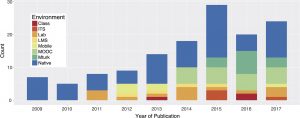Posted in July 2018
Social Presence in MOOCs
This article is published in the international journal IRRODL Vol 19, No 3 (2018).
Abstract
The capacity to foster interpersonal interactions in massive open online courses (MOOCs) has frequently been contested, particularly when learner interactions are limited to MOOC forums. The establishment of social presence—a perceived sense of somebody being present and “real”—is among the strategies to tackle the challenges of online learning and could be applied in MOOCs. Thus far, social presence in MOOCs has been under-researched. Studies that previously examined social presence in MOOCs did not account for the peculiar nature of open online learning. In contrast to the existing work, this study seeks to understand how learners perceive social presence, and the different nuances of social presence in diverse MOOC populations. In particular, we compare perceptions of social presence across the groups of learners with different patterns of forum participation in three edX MOOCs. The findings reveal substantial differences in how learners with varying forum activity perceive social presence. Perceptions of social presence also differed in courses with the varying volume of forum interaction and duration. Finally, learners with sustained forum activity generally reported higher social presence scores that included low affectivity and strong group cohesion perceptions. With this in mind, this study is significant because of the insights into brings to the current body of knowledge around social presence in MOOCs. The study’s findings also raise questions about the effectiveness of transferring existing socio-constructivist constructs into the MOOC contexts.
Keywords
social presence, MOOCs, forum participation
Reference
Poquet, O., Kovanović, V., de Vries, P., Hennis, T., Joksimović, S., Gašević, D., & Dawson, S. (2018). Social Presence in Massive Open Online Courses. The International Review Of Research In Open And Distributed Learning, 19(3). doi:http://dx.doi.org/10.19173/irrodl.v19i3.3370
Download
Activating learning at scale: A review of innovations in online learning strategies
The Article “Activating learning at scale: A review of innovations in online learning strategies” was published in the journal Computer & Education.
Higlights
- A systematic review on scalable learning strategies was conducted.
- Results synthesize 126 studies including 132,428 participants.
- Large-scale experiments yield a far lower rate of positive results.
- Cooperative, gamified, and interactive learning strategies are the most effective.
Abstract
Making advantage of the vast history of theoretical and empirical findings in the learning literature we have inherited, this research offers a synthesis of prior findings in the domain of empirically evaluated active learning strategies in digital learning environments. The primary concern of the present study is to evaluate these findings with an eye towards scalable learning. Massive Open Online Courses (MOOCs) have emerged as the new way to reach the masses with educational materials, but so far they have failed to maintain learners’ attention over the long term. Even though we now understand how effective active learning principles are for learners, the current landscape of MOOC pedagogy too often allows for passivity — leading to the unsatisfactory performance experienced by many MOOC learners today. As a starting point to this research we took John Hattie’s seminal work from 2008 on learning strategies used to facilitate active learning. We considered research published between 2009 and 2017 that presents empirical evaluations of these learning strategies. Through our systematic search we found 126 papers meeting our criteria and categorized them according to Hattie’s learning strategies. We found large-scale experiments to be the most challenging environment for experimentation due to their size, heterogeneity of participants, and platform restrictions, and we identified the three most promising strategies for effectively leveraging learning at scale as Cooperative Learning, Simulations & Gaming, and Interactive Multimedia.
Keywords
Teaching/learning strategies, Adult learning, Evaluation of CAL systems, Interactive learning environments, Multimedia/hypermedia systems
Reference
Dan Davis, Guanliang Chen, Claudia Hauff, Geert-Jan Houben (2018) Activating learning at scale: A review of innovations in online learning strategies, Computers & Education, Volume 125, 2018, Pages 327-344, ISSN 0360-1315, https://doi.org/10.1016/j.compedu.2018.05.019.

